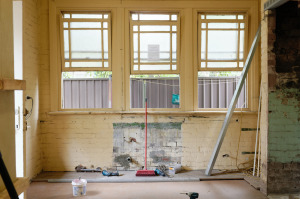Thinking about buying your first home, or maybe ready to buy on your own after a divorce? When you finally decide that it’s time to take the BIG step into home ownership, it can be so exciting that you’re likely to skip a lot of important steps. I mean, the fun part is looking at houses so most people want to start there. But slow your roll, there’s more to consider. This is, for many people, the biggest investment of your life, so it’s crucial you don’t make a misstep! Here are all the ins and outs of what to know before buying a house (a.k.a, the things I wish I knew before I bought my first house).

1. Get Prequalified
It’s SO important to know what you can afford before you start looking. Trust that if you miss this step you will fall in love with something you can’t afford and everything else will look awful in comparison. Also you could find the absolute perfect home only to be beat out by another buyer who is more prepared. Buying your first real estate should be exciting, not disappointing.
2. Strengthen Your Credit
Once you’re prequalified or preapproved, focus on keeping your credit pristine. Don’t open ANY new credit accounts (like a new credit card or buying a car). But also don’t close any accounts as this can actually lower your score. And of course, pay everything on time or early.
3. Research Your Mortgage Options
Many people don’t know this, but there are a lot of mortgage types beyond just FHA or Conventional. If you live in a rural area, USDA loans might work for you and often don’t require a down payment. If you are a veteran, a VA loan is probably best for you — the interest rates are great and the down payments are super low.
4. Research Down Payment Assistance Programs
Many states and local governments offer down payment assistance programs for first time buyers. Some are income based, but many relate to your job. First responders and teachers often qualify for down payment assistance. There are also tax credits for first time buyers as well.
5. Consider Paying Points
If you have a good chunk of money saved for a down payment, make sure to get two quotes from lenders. The first will be using all your savings as a down payment and getting a traditional 30- or 15-year mortgage. The second would be using some of the savings to pay “points,” which is basically paying some of the mortgage interest up front which can dramatically lower your monthly payment. It’s a good option if you plan to stay in the home a long time.
6. Consider Unconventional Home Options

Did you know that buying a duplex, triplex, or fourplex uses the exact same type of mortgage as a single family home, even FHA or VA? And often, the potential or actual rent of the other units can be used as income to qualify for a higher mortgage. If this is something you would consider, it can be a fantastic option. Your rental income could cover your mortgage, making you basically live for free. If you stay in the property for a couple of years, you can use the income later to qualify for an even nicer single family home for the future. This is something I recommend to everyone because it’s the first step to building passive income — rents always go up while your mortgage payment will always be the same.
7. Never Skip The Home Inspection
I don’t care if your man is Bob Vila, you still need a professional home inspection once you’re in escrow. There could be problems with the house that aren’t visible to the eye that can make your dream home a real money pit. Cracks in the foundation, roof issues, major plumbing problems, or mold? No, thanks. Even if you’re planning to buy a fixer upper and do the work yourselves, you need to know exactly what will need to be done so you can budget appropriately.
8. Negotiate, Negotiate, Negotiate!

Did you find a property you love, but it needs carpet and paint and that’s not in your budget? Or maybe you need some help with your closing costs? Don’t be afraid to negotiate and ask for what you want or need. You can always raise your offer price a little and ask for that extra to be refunded to you at closing or used to pay your closing costs. Or take your home inspection results and ask the seller to do many of the recommended repairs.
9. Don’t Overbuy
Your lender may tell you that you can afford a larger mortgage than you were intending. It’s all based on keeping your mortgage payment within a certain percentage range of your monthly income. But only YOU know your financial situation and spending habits. Don’t let anyone talk you into buying more house than you can really comfortably afford. Figure out what you are comfortable spending monthly (don’t forget about property taxes and insurance costs as well) and insist on sticking to that budget. One thing many former renters forget about is that YOU will be responsible for any maintenance issues or repairs for the home — no landlord to call when things go wrong! Budget for this as well.
10. Buy A Home Warranty

Touching on my last comment, you need a home warranty for your first year in the new property. Either you can buy one or you can ask the seller to provide one as part of your offer. In my experience, even if the home inspection looks great, what can go wrong will go wrong. It’s better to have the warranty and give yourself the first year in the home worry-free.

Is there anything you’d add to our list of what to know before buying a house? Did any of these tips help you? Let us know in the comments!
For More Life Tips, Check Out:
Here’s Why You Need To Start Estate Planning, No Matter How Old Or Wealthy You Are

